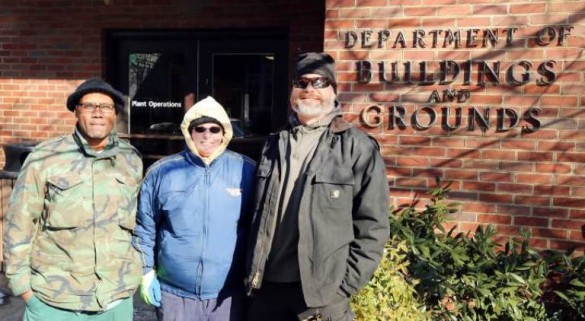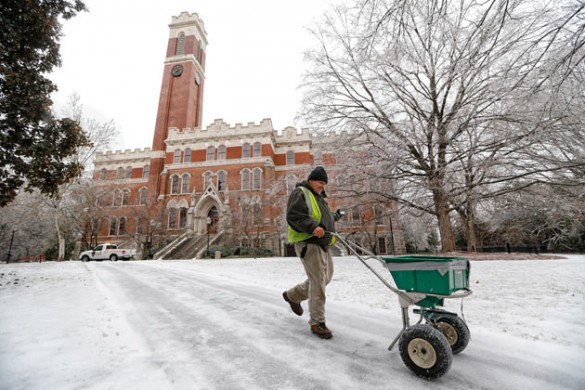
A wide smile spreads across the face of Timothy Cole as he recalls the gratitude that’s been directed his way by faculty and staff recently.
“Me myself, I’m out there in the field doing the laborious work,” he said with remarkably good cheer for a man who’s been working 14-hour days for half a week. “I’m doing it with the shoveling and the salting.
“It’s common for students and faculty passing by to stop and say, ‘Thanks,’ and ‘That work looks very hard,’” Cole said. “[rquote]I take it in a good light. It’s good exercise for me, and I like to see to it that it’s safe for them to get by.”[/rquote]
Cole is one of dozens of Vanderbilt University Plant Operations employees who worked overtime to see that the campus got up to speed as quickly as possible following an ice storm that hit the evening of Feb. 15. Classes were canceled for two days, a rare occurrence in university history. Another storm struck the afternoon of Feb. 20, making another round of salting and shoveling necessary.
Planning for the storm began long before the recent storms were even a thought in any weatherperson’s head, said Mark Petty, assistant vice chancellor for plant operations.
“We make sure we always have 6 tons of sand, 3 tons of salt and 25 pallets of Ice Melt on hand, enough for a three-day event,” Petty said. “In this situation, we started Sunday afternoon (Feb. 15) pre-salting walks and roads.”
Even so, layers of snow on top of sheets of ice made for treacherous roads and campus sidewalks by the following morning. The call by Provost Susan Wente to cancel classes meant workers didn’t have to dodge many walkers while they shoveled, scraped and salted on Monday and Tuesday.
“We’ve been running around trying to do damage control and keep pathways open, keep buildings open, keep things out of doorways,” said Becket DeChant, a campus arborist who has been helping out with general snow removal as well as looking after campus trees.
“Then we go back and clean up more thoroughly as time allows,” he said.
Custodial workers were responsible for the steps of the buildings they clean, and 6 to 8 feet around the doorways, Petty said.
“Many of our custodial workers also helped out chipping out sidewalks after they were done with their regular duties,” he said.

It’s always expected that the longer a weather event lasts, the more problems like equipment breakdowns and people unable to get to work will crop up, Petty said. As much as they can be, these issues are covered in planning.
“One-day events are usually no big deal,” he said. “But when they drag on into multiple days, we try and provide a place for employees to stay so they don’t have to worry about getting back and forth to work. In this instance, we had probably 50 people staying at the Scarritt-Bennett Center near campus on Monday and Tuesday nights.”
Vanderbilt Campus Dining took on the task of feeding the workers at The Commons Dining Center, even though they had reduced staff because of the weather.
“On Tuesday, Laura Nairon (assistant vice chancellor for business services) was helping bus tables at The Commons,” said Eric Kopstain, vice chancellor for administration. “There was that spirit of everybody chipping in to get the job done.”
No one looks forward to winter storms, but like a fireman trained to fight fires, Vanderbilt employees are ready when it happens, DeChant said.
“You have that adrenalin jolt, and you throw yourself in to get it done,” he said. “There’s nobody better equipped for it. Nobody knows the campus better than the people who are out in it every day.
“People step up when called upon,” he said.